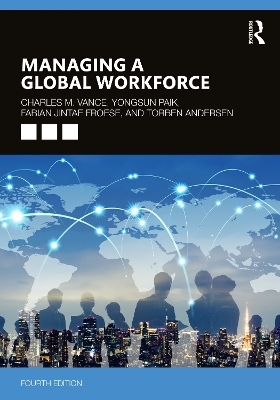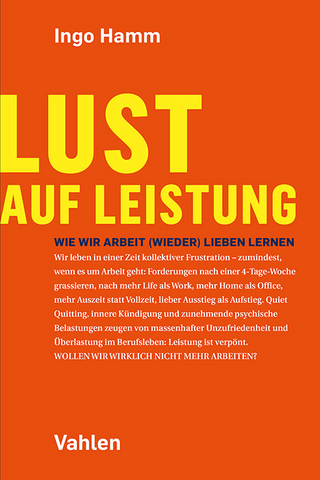
Managing a Global Workforce
Routledge (Verlag)
978-1-032-16145-7 (ISBN)
This fourth edition includes significant updates to reflect recent global developments affecting the management of global HRM, including the following:
• The COVID-19 pandemic and its impact on new work expectations/arrangements;
• The Great Resignation;
• AI and automation;
• Managing diversity, equity, and inclusion;
• Climate change;
• Emerging economies; and
• CSR/ethics/sustainability
The new edition also includes several new opening and closing brief cases to promote applied reflection and discussion, as well as updated references to important research. With its practical, real-world emphasis, including frequent use of current examples, the text also serves as a useful resource for guiding the global workforce management and decision-making of current and future general managers and human resource practitioners.
This book is essential reading for general graduate and undergraduate business students, as well as those in specialty programs in International Business and Human Resources.
Charles Vance is an active researcher, graduate and undergraduate instructor, and consultant in areas of international human resources and training development. He has published widely, and his work has taken him to many countries in the Americas, Europe, and Asia. He is now professor emeritus at Loyola Marymount University, USA. Yongsun Paik is Professor of International Business and Management, Director of the Center for International Business Education and the Center for Asian Business at Loyola Marymount University, USA. His primary research interests focus on international human resource management, international entrepreneurship, business ethics, and Asia Pacific business studies. Fabian Jintae Froese is Chair Professor of Human Resource Management and Asian Business at the University of Göttingen, Germany, and a Joint Appointment Professor of International Business at Yonsei University, South Korea. In addition, he is Editor-in-Chief of Asian Business & Management and Associate Editor of the International Journal of Human Resource Management. His areas of expertise are in expatriation, diversity, talent management, and digital HRM. Torben Andersen is Associate Professor, PhD (CBS and University of Warwick) and works at Department of Business Development and Technology (Herning), Aarhus University, Denmark. Torben Andersen’s research has been concentrating on structural, strategic, and change aspects of HRM and International HRM. He was visiting professor at San Francisco State University (2000), University of Auckland, New Zealand (2005), and Bamberg University (2016). He has taught in a variety of countries from Iceland, Germany, the UK, China, and New Zealand to the USA.
TABLE OF CONTENTS
Preface......................................................................................................................
Introduction and Overview..............................................................................
Opening Scenario: Trading Places in Global Trade
Introduction
Global Market Context
Internal Company Factors Influencing HRM
Key Perspectives in Global Workforce Management
Book Overview
Summary
Questions for Opening Scenario Analysis
Case 1.1. The United Nations of Bananas
Case 1.2: Social Expat-Preneurs: Key Agents for Building a Better World
Recommended Website Resources
Recommended Readings
References
The Global Labor Market: Challenges and Prospects
Opening Scenario: Finland’s Efforts to Attract Global Talent
Introduction
The Demograpic Impact of the Covid-19 Pandemic
Changes in Labor Force Demographics and Migration
Emergence of the Contingent Workforce
Offshore Sourcing Versus Onshoring
Global Workforce Management Challenges
Summary
Questions for Opening Scenario Analysis
Case 2.1. The Chinese are Moving to Africa to Make Shoes
Case 2.2. India is Sending Jobs Abroad
Recommended Website Resources
Recommended Readings
References
Cultural Foundations of International HRM
Opening Scenario: How Multicultural Teams Succeed
Introduction
Understanding Culture
Major Models of International Culture
Final Caveats on Culture and Global Workforce Management
Summary
Questions for Opening Scenario Analysis
Case 3.1. Cross-Cultural Assessment Over a Cup of Coffee
Case 3.2. Culture Conflict South of the Border, Down Mexico Way
Recommended Website Resources
Recommended Readings
References
Successful MNC Strategy Through International HRM
Opening Scenario: How Do MNCs Compete in Emerging Markets?
Introduction
MNC Competitive Strategies
Structuring for Optimal Global Performance
Increased Role of HR Management in Cross-Border Strategic Alliances and Mergers and Acquisitions
Paradigm Shift of International HRM from Contingency Model to Global Talent Management Process Development Model
Summary
Questions for Opening Scenario Analysis
Case 4.1. Roadblocks to India’s Apollo Tires’ Acquisition of U.S.’s Cooper Tire
Case 4.2. Is Accenture’s Global Face Really a Facade?
Recommended Website Resources
Recommended Readings
References
Global Human Resource Planning
Opening Scenario: Who are Our Employees, Anyway?
Introduction
Strategy Link to Work Demand and Labor Supply
Job Design for Meeting Global Strategy Work Demand
Sources of Global Labor Supply for Meeting Work Demand
HR Planning for the Longer Term
Summary
Questions for Opening Scenario Analysis
Case 5.1. Gender Discrimination in Japan: Growing Challenges and Opportunities
Case 5.2. HR Planning for Dexterity Capability in the Face of Uncertainty and Rapid Change
Recommended Website Resources
Recommended Readings
References
Global Staffing
Opening Scenario: Global Staffing at Shell
Introduction
Key Factors Affecting Global Staffing
Global Workforce Recruitment
Global Workforce Selection
Summary
Questions for Opening Scenario Analysis
Case 6.1. Brazil’s Economic Boom Needs More Talent
Case 6.2. MNC Staffing Practices and Local Anti-Discrimination Laws
Recommended Website Resources
Recommended Readings
References
Global Learning and Development
Opening Scenario: Well-Intentioned but Misguided Expatriate Preparation and Training
Introduction
Strategic Role of Learning and Development
Key Concepts for Guiding Global Learning and Development
Training Imperatives for the Global Workforce
Building Global Alignment
Learning Considerations for Assigned Expatriates
Special Learning Considerations for Female Expatriates
HCN Learning Considerations
Summary
Questions for Opening Scenario Analysis
Case 7.1. Safety Training Insights for Women Expats in India
Case 7.2. HCN Supervisory Training Needs
Recommended Website Resources
Recommended Readings
References
Managing International Assignments
Opening Scenario: Expatriate Innocence Abroad
Introduction
The Expatriation Cycle
Considerations for Different Types of Expatriates
Flexible and Virtual Types of Global Mobility
Summary
Questions for Opening Scenario Analysis
CASE 8.1. Working in a Sheltered Enclave in Kuala Lumpur, Malaysia
Case 8.2. Re-Entry Shock: A Family Affair
Recommended Website Resources
Recommended Readings
References
Global Workforce Performance Management
Opening Scenario: Puzzling Performance Appraisal
Introduction
Performance Management Process
Important Global Performance Management Considerations
Planning and Implementing Global Performance Appraisals
Summary
Questions for Opening Scenario Analysis
Case 9.1. Overcoming Gender Stereotyping in Performance Management
Case 9.2. Customizing HCN Performance Appraisal Design
Recommended Website Resources
Recommended Readings
References
Managing Compensation and Rewards for a Global Workforce
Opening Scenario: Challenges in International Pay Equity
Introduction
Key Practices for Managing International Compensation
Key Considerations for Expatriates, HCNs, and TCNs
Summary
Questions for Opening Scenario Analysis
Case 6.1. Brazil’s Economic Boom Needs More Talent
Case 6.2. MNC Staffing Practices and Local Anti-Discrimination Laws
Recommended Website Resources
Recommended Readings
References
Optimizing the Employment Relationship
Opening Scenario: Workplace Demoralization or Engagement: A Laissez-Faire Roll of the Dice
Introduction
Current ER Issues
Role of MNCs in Global Employee Relations
Important MNC Practices for Effective Global ER
Role of Labor Unions in Global ER
Summary
Questions for Opening Scenario Analysis
Case 11.1. Planning for an Impending Pandemic
Case 11.2. Providing Expatriate EAP and Other Personal Care Services
Recommended Website Resources
Recommended Readings
References
Index
| Erscheinungsdatum | 27.07.2023 |
|---|---|
| Zusatzinfo | 41 Line drawings, black and white; 3 Halftones, black and white; 44 Illustrations, black and white |
| Verlagsort | London |
| Sprache | englisch |
| Maße | 178 x 254 mm |
| Gewicht | 721 g |
| Themenwelt | Wirtschaft ► Betriebswirtschaft / Management ► Personalwesen |
| Wirtschaft ► Betriebswirtschaft / Management ► Unternehmensführung / Management | |
| Wirtschaft ► Volkswirtschaftslehre | |
| ISBN-10 | 1-032-16145-0 / 1032161450 |
| ISBN-13 | 978-1-032-16145-7 / 9781032161457 |
| Zustand | Neuware |
| Informationen gemäß Produktsicherheitsverordnung (GPSR) | |
| Haben Sie eine Frage zum Produkt? |
aus dem Bereich


